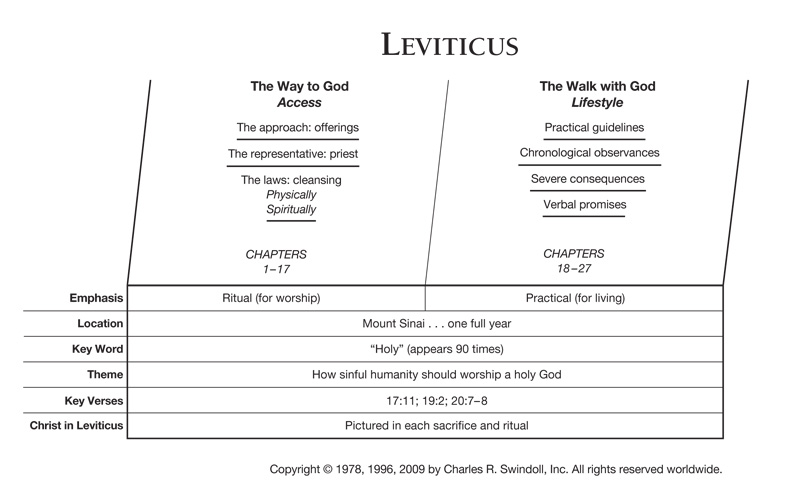
WHO WROTE LEVITICUS?
The content of Leviticus relates directly to Exodus, providing evidence that the same hand penned both books. The arguments that support Moses’ writing of Exodus also uphold Moses’ authorship of Leviticus. Additionally, we find more than fifty occasions when the text says something like, “The LORD spoke to Moses” (Leviticus 1:1; 4:1; 5:14; 6:1). The New Testament also refers to Moses as the author of passages from Leviticus (Matthew 8:4; Luke 2:22; Hebrews 8:5).
The word Leviticus derives from the tribe of Levi, whose members were set aside by the Lord to be His priests and worship leaders. As a title, the word is translated from the Septuagint, meaning “ ‘pertaining to the Levites,’ and although that tribe as such is not emphasized throughout the book, the priestly subject matter renders the title appropriate.”1 Its content was originally meant to instruct the new nation of Israel in proper worship and right living, so that they might reflect the character of their divine King.
WHERE ARE WE?
The Law found in Leviticus was spoken by God to Moses at or near Mount Sinai, where the Israelites camped for some time. Because God delivered these detailed laws after the original Ten Commandments, the most probable date for their revelation is 1446 BC. Whether every law was written down at that time is impossible to determine; it may be that they were codified progressively during the ensuing 40-year wandering.
WHY IS LEVITICUS SO IMPORTANT?
“The book of Leviticus was the first book studied by a Jewish child; yet is often among the last books of the Bible to be studied by a Christian.”2 Today’s readers are often put off by the book’s lists of laws regarding diet, sacrifice, and social behaviour. But within these highly detailed directives we discover the holiness—the separateness, distinction, and utter “otherness”—of God. And we learn how sin devastates humanity’s relationship with their Creator.
God established the sacrificial system so that His covenant people might enjoy His fellowship through worship; it also allowed for repentance and renewal:
When an Israelite worshipper laid his hand on the animal victim, he identified himself with the animal as his substitute...this accomplished a symbolic transfer of his sin and a legal transfer of his guilt to the animal victim. God then accepted the slaughter of the animal...as a ransom payment for the particular sin which occasioned it.1
Many years after Moses wrote Leviticus, Jesus came to offer Himself as the ultimate sacrifice, holy and perfect, once for all, fulfilling the Law and rendering future animal sacrifices unnecessary and void (Hebrews 10:10).
WHAT'S THE BIG IDEA IN LEVITICUS?
The overall message of Leviticus is sanctification. The book communicates that receiving God’s forgiveness and acceptance should be followed by holy living and spiritual growth. Now that Israel had been redeemed by God, they were to be purified into a people worthy of their God. “You shall be holy, for I the Lord your God am holy,” says Leviticus 19:2. In Leviticus we learn that God loves to be approached, but we must do so on His terms.
HOW DO I APPLY THIS?
This theme of holiness extends to the church. In the New Testament,
1 Peter 1:15-16 references Leviticus 19:2 when it says: “like the Holy One who called you, be holy yourselves also in all your behavior; because it is written, ‘You shall be holy, for I am holy.’” Those who are redeemed by the mercies of God offer different sacrifices today; they offer themselves (Romans 12:1).
Like He did with the Israelites, God has redeemed and consecrated Christians. Jesus offered Himself as the perfect sacrifice on our behalf, taking the punishment that we deserved so that we might be forgiven. Those who place their trust in Jesus’ atoning act become God’s children, saved by grace (Ephesians 2:8–9).
If you are His child, then He wants you to reflect His character. He is sanctifying you much like He did the nation of Israel. Does your life echo His? In what ways are you growing more like Christ?
End Notes
1. Raymond B. Dillard and Tremper Longman, III, An Introduction to the Old Testament (Grand Rapids: Zondervan, 1994), 73.
2. F. Duane Lindsey, "Leviticus," in The Bible Knowledge Commentary: Old Testament, ed. John F. Walvoord and Roy B. Zuck (Wheaton, Ill.: Victor Books, 1985), 163.
3. Lindsey, "Leviticus," 166.

